Military Psychiatry - Military personnel have always cared about their physical health, but in today's armed forces, mental health is essential to mission success. The military has changed many of its policies in recent years to promote mental health.
The Department of Defense recognizes that untreated mental health poses a greater safety threat than the mental health conditions you seek treatment for. regarding to. According to the person who made this request, these children are very angry with the past actions of their society.
Military Psychiatry
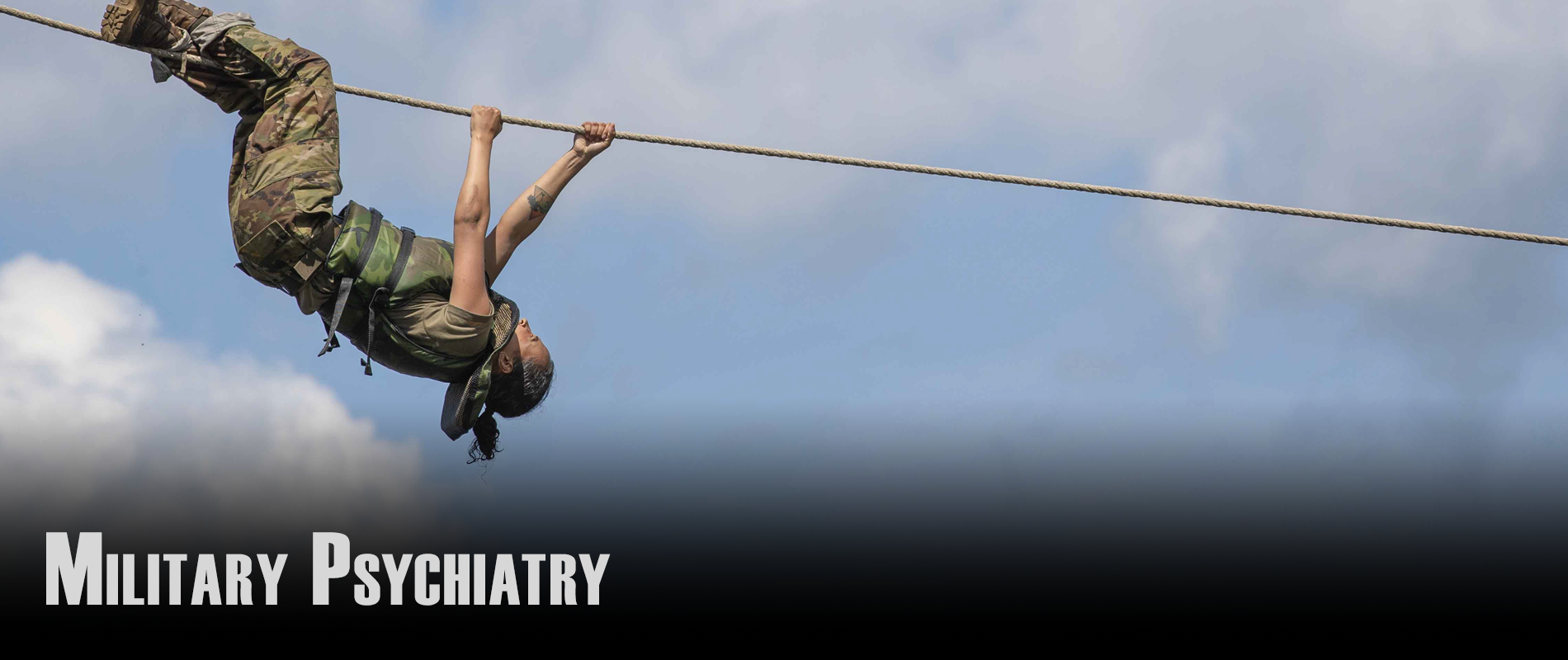
As gays, these people need to drink cement and harden the damn thing, we screwed it up for so long. When you seek mental health care, your care provider will inform you that they follow the Department of Defense's privacy guidelines set forth by HIPAA and the Privacy Act.
How Will Asking For Mental Health Treatment Affect My Career?
These guidelines ensure the confidentiality of your mental health records in most cases. However, if care providers learn that your mental health condition may endanger themselves, others, or the mission, they are required to share this information with the chain of command.
Maronite Catholic group from Dulwich Hill Christian Life Matters. These are the groups that Sky News is destroying. Christian fascist black shirts are what we need in Sydney. If commanders or supervisors observe behaviors that appear to endanger safety or job performance, they may request a command-based behavioral health evaluation.
A scheduled evaluation does not guarantee the same confidentiality as when you are seeking medical advice. If someone you know tells you about a mental health concern, don't laugh it off or promise it will get better on its own, even if you're trying to comfort the person.
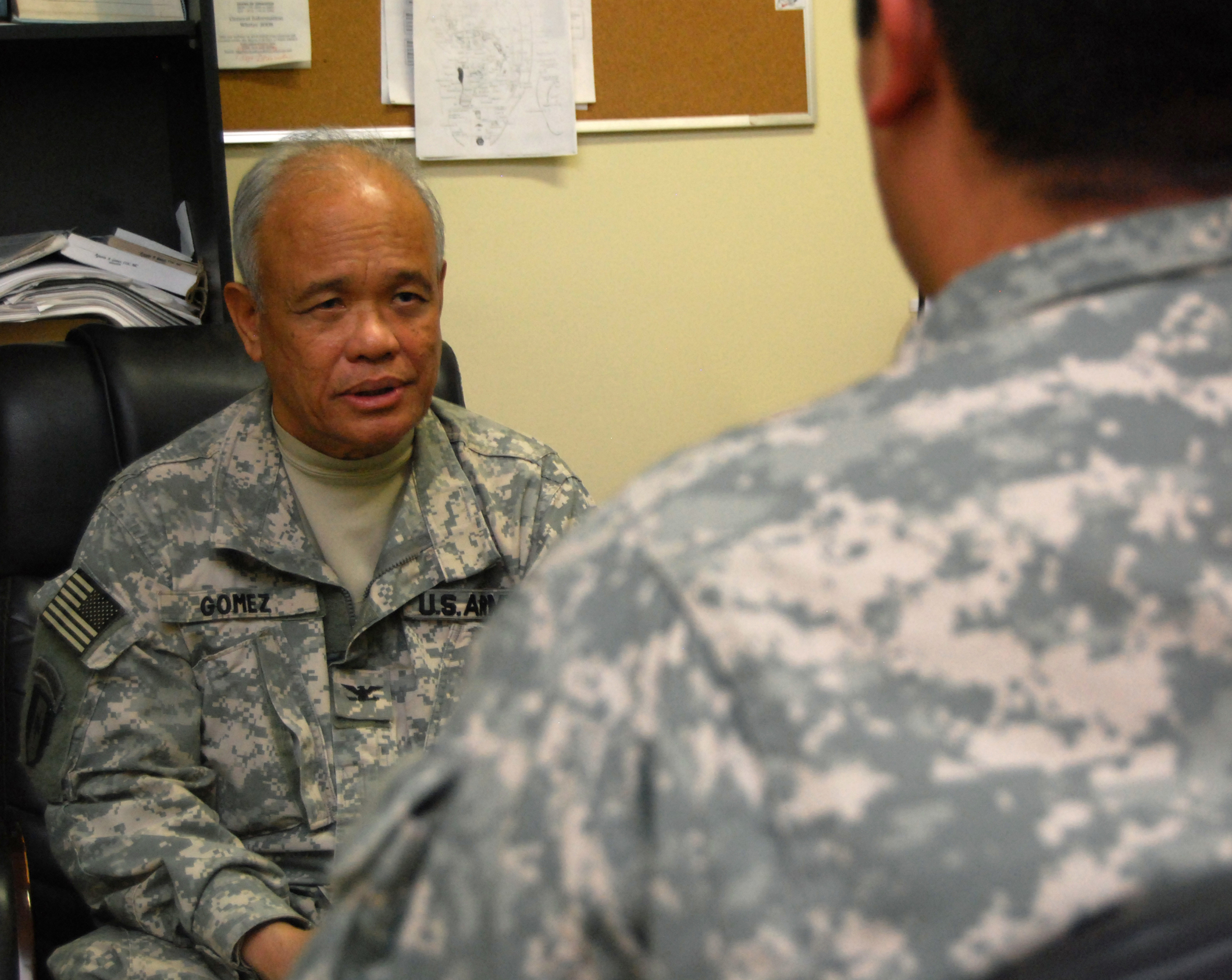
The stresses of deployment and military life put soldiers at risk for mental illness and complicate treatment. The military medical system cannot succeed in its mission to "restore the fighting force" without the assistance of all personnel to encourage prompt treatment of mental health conditions before they deteriorate.
Military Policy And Your Privacy
According to a 2014 study in JAMA Psychiatry, nearly 1 in 4 active duty service members show symptoms of a mental health condition. On this page, we focus on questions military personnel often ask about health care resources, exposures, and staying healthy during the transition to civilian life.
If you are having suicidal thoughts, the Veterans Crisis Line is available 24 hours a day by dialing 1-800-273-8255 and pressing 1. The following are trademarks of NAMI: NAMI, NAMI Basics, NAMI Connection, NAMI End of Silence, NAMI FaithNet, NAMI Family and Friends, NAMI Family Support Group, NAMI Family to Family, NAMI State Rankings,
NAMI Hearts and Minds. NAMI Home Front, NAMI Helpline, NAMI in Our Own Voice, NAMI on Campus, NAMI Parents and Teachers as Allies, NAMI Partner, NAMI Providers, NAMI Smart for Advocacy, Act4MentalHealth , Vote4MentalHealth, INAMI in National Health.
All other programs and services are trademarks of their respective owners. FOIA Web Policy HHS Vulnerability Disclosure is a secure site. https:// ensures that you are connected to an official website and any information you provide is encrypted and transmitted securely.
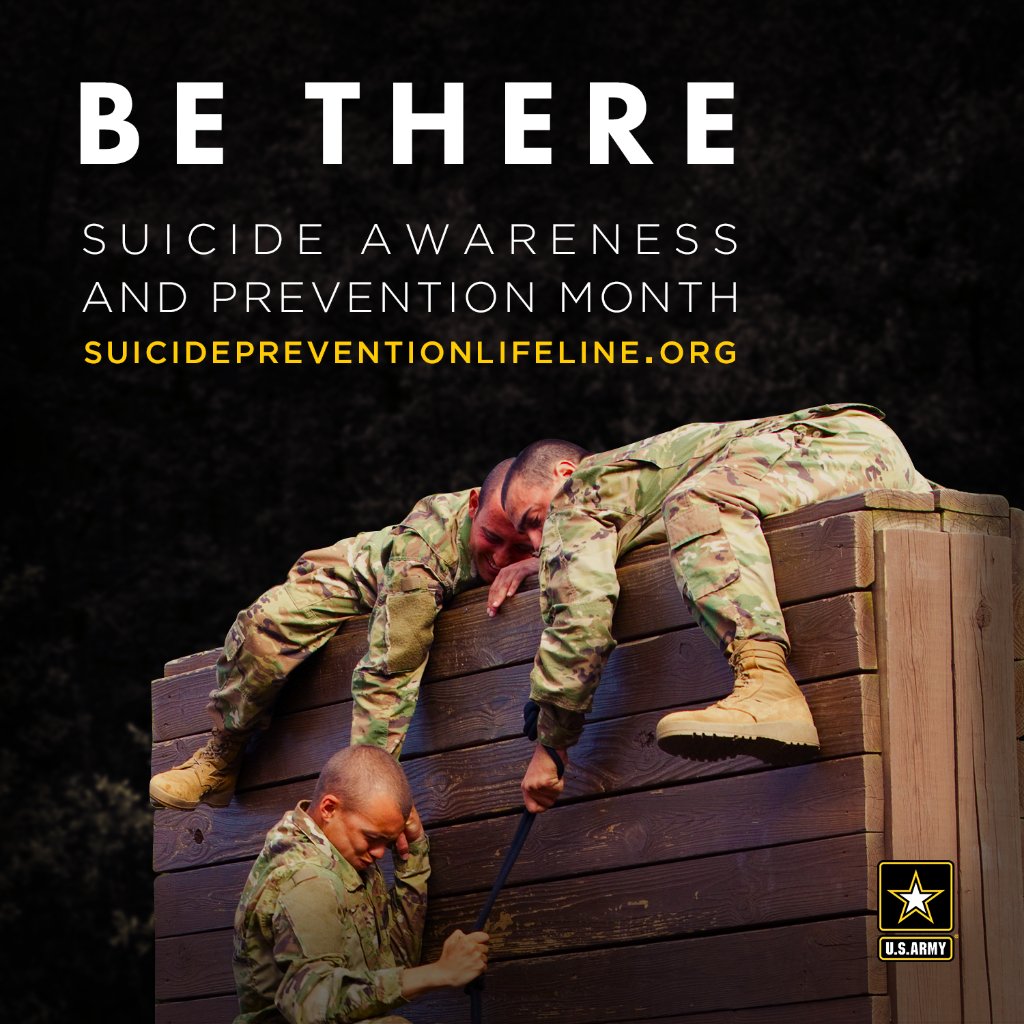 Source: pbs.twimg.com
Source: pbs.twimg.com
How Can I Help A Fellow Warrior?
Strengthening our combat forces is a collective effort. If you're worried about a friend or colleague, the most important thing you can do is ask how they're doing and listen without judgment. Symptoms of mental illness sometimes cause people to forget that mission success depends on maintaining a healthy mind and body.
They may not realize that their anxiety is a sign of mental illness. Listen patiently, encourage, and remind them that anyone can experience these symptoms, from the private to the general. Note that resets take time.
Give yourself the opportunity to maintain your physical and mental health during the transition. At NAMI, we understand the questions many service members face when returning to civilian life. We are here to help. Check with your local NAMI affiliate to see if they offer a sponsorship program for returnees.
If a medical officer or military care provider determines that your health is at risk, the officer will share your medical information with commanding officers. Information they are allowed to share includes your diagnosis and medically prescribed job restrictions.
Making A Strong Transition To Civilian Life
Squad commanders will decide what duties to assign you until your condition improves. Returning to civilian life can be an exciting time, but it can also be a time of emotional turmoil. Your experiences in the ministry may change your outlook on life.
 Source: images05.military.com
Source: images05.military.com
You may have new skills, new friendships, or new concerns. According to the 2014 rules, talking to a doctor about your concerns, asking if you need a diagnosis or treatment, does not affect your job. If your doctor needs to disclose your condition, your job is not at risk from that disclosure.
The important thing to remember is that you are not alone. There are many people who want to support you. You can start preparing now by checking out the VA's list of common challenges and solutions or MilitaryOneSource's database of websites that offer help with the transition to civilian life.
Military psychiatry is a subfield of psychiatry that covers specific aspects of mental health in the military context. This includes preventive measures, treatment and research. Preventive measures are evidence-based interventions that improve the readiness and resilience of service personnel during the deployment period (eg, alcohol awareness, sleep hygiene, stress management, anger management, grounding techniques).
Who Should I Tell?
, and more). For example, in the military, PHI policy states that information is released only when there is a serious threat of harm to self, others, or the mission. After admission or discharge from hospital;
When entering formal substance abuse treatment; and when enrolling in personnel accreditation programs. A family member who works at a restaurant on King Street said they harassed customers and threw glasses of water and wine at them.
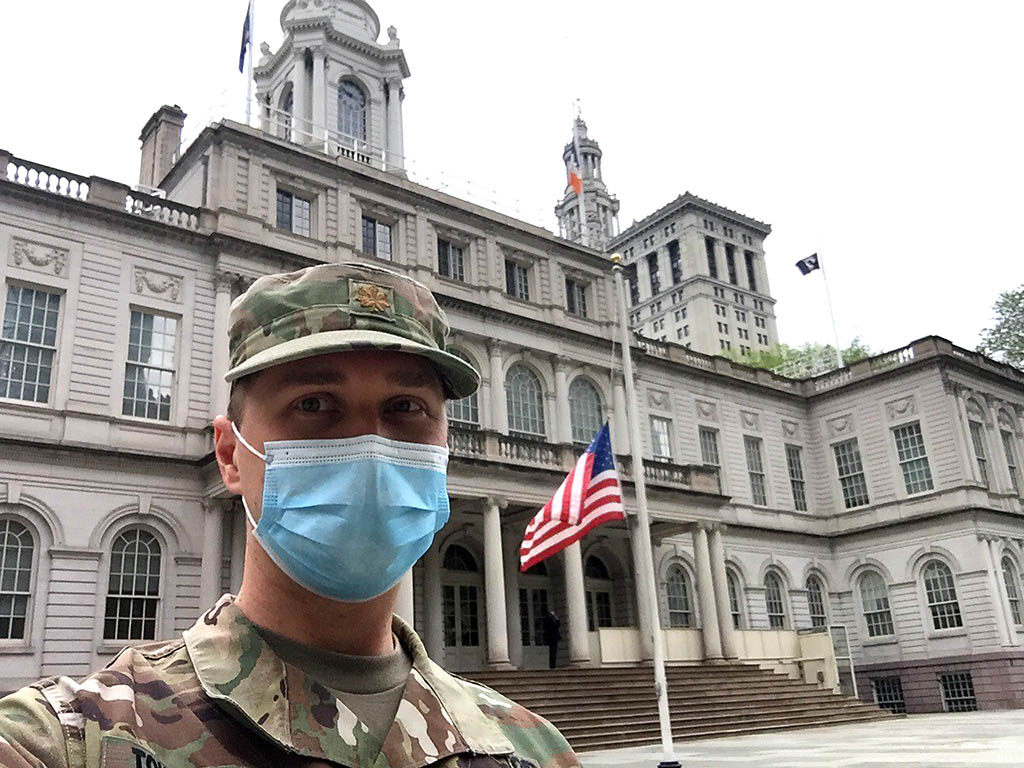 Source: www.clarksvilleonline.com
Source: www.clarksvilleonline.com
There were as many police as the demonstrators, but they did not stop them. They were like police guards. In addition, by changing the security clearance procedures, you no longer risk losing your doctor's license. If you're looking for help with war-related issues or getting marriage counseling, you don't have to worry about "21 questions" about treating mental or emotional conditions.
.gov means official. Federal government websites are often called .gov or .mil. Conclusion Before sharing sensitive information, make sure you are on a federal government site Air Force life can add special stresses in addition to the normal stresses of everyday life.
Psychiatrists who specialize in the diagnosis, treatment and prevention of mental health and emotional problems play an important role in caring for the overall well-being of their patients. With extensive medical training, these physicians understand the complex relationship between emotional and medical illness in order to better care for the holistic mental health needs of their patients.
Remind your fellow soldiers that the primary mission of the armed forces is to maintain a strong fighting force. Share the information here. Emphasize that talking to a counselor or medical officer will not jeopardize employment or security clearance, and that each service member has a responsibility to seek counseling and treatment as needed.
Wartime emergency psychiatric care is usually provided in the field (ie, psychological first aid, initial psychotherapy and pharmacological treatment, etc.) in order to reduce the spread of mental illness in the military context. Peacetime care focuses on the screening, diagnosis and treatment of patients who may be current or retired military personnel and their families.
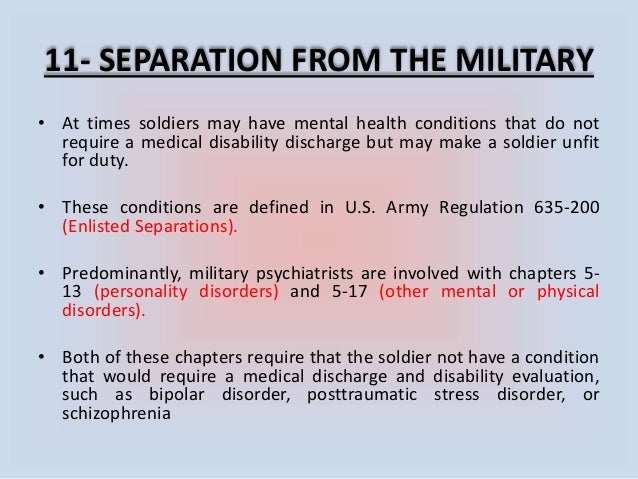 Source: image.slidesharecdn.com
Source: image.slidesharecdn.com
Research in military psychology provides better insight into mental health issues in the military context and provides a basis for improving existing interventions. Service men and women owe it to their fellow members to remain in good physical and mental health.
If you're concerned about a possible mental health condition—or if you're entering the armed forces with a past or current mental health condition—be aware that the armed forces do not require service members to have mental health issues in their ranks.
to expose Command It is the responsibility of the medical officers and care providers you consult with to decide whether to disclose your condition. They are trained in military policies on protecting the privacy of health information (PHI).
Here are the people you need to talk to. If you've been in combat or similar stressful situations, some of the habits that help you stay strong during traumatic events may be less helpful in civilian life.
Staying strong in civilian life may require developing new habits. You may also be at risk for PTSD and other symptoms as your brain recovers from the trauma. Some veterans find that they miss the structure that military life provides.
Some lose a sense of purpose in their daily work. Others may feel alienated because civilians don't understand the service experience. It may take time to process the memories of your experiences. National Library of Medicine 8600 Rockville Pike Bethesda, MD 20894 Military records show that talking to a doctor is a good career move.
According to a 2006 study in Military Medicine, 97% of personnel who seek mental health treatment do not experience adverse effects of work. The same study found that ignoring mental health conditions is dangerous. If worse comes to worst, a commanding officer can require a mental health evaluation, which can be very damaging to your career.
Among those who were responsible for the evaluation, 39% had a negative impact on their work. You can avoid situations that require disclosure by discussing your concerns with providers as they arise. Ignoring the symptoms may make them worse.
A mental health condition may only affect you at first, but if your condition does not improve, your ability to perform tasks may suffer.
psychiatrist military, military psychiatric hospital, army psychiatry, veterans psychiatrist near me, army psychiatrist, military veterans and mental health, military psychiatrist salary, psychiatrist for veterans

 Source: api.time.com
Source: api.time.com Source: res.cloudinary.com
Source: res.cloudinary.com Source: compote.slate.com
Source: compote.slate.com Source: www.original-house.co.uk
Source: www.original-house.co.uk
 Source: www.forces.net
Source: www.forces.net Source: imgv2-1-f.scribdassets.com
Source: imgv2-1-f.scribdassets.com Source: static01.nyt.com
Source: static01.nyt.com Source: ca-times.brightspotcdn.com
Source: ca-times.brightspotcdn.com Source: image.cnbcfm.com
Source: image.cnbcfm.com
 Source: images.ctfassets.net
Source: images.ctfassets.net Source: cdniq.us1.myspdn.com
Source: cdniq.us1.myspdn.com Source: i.pinimg.com
Source: i.pinimg.com Source: images04.military.com
Source: images04.military.com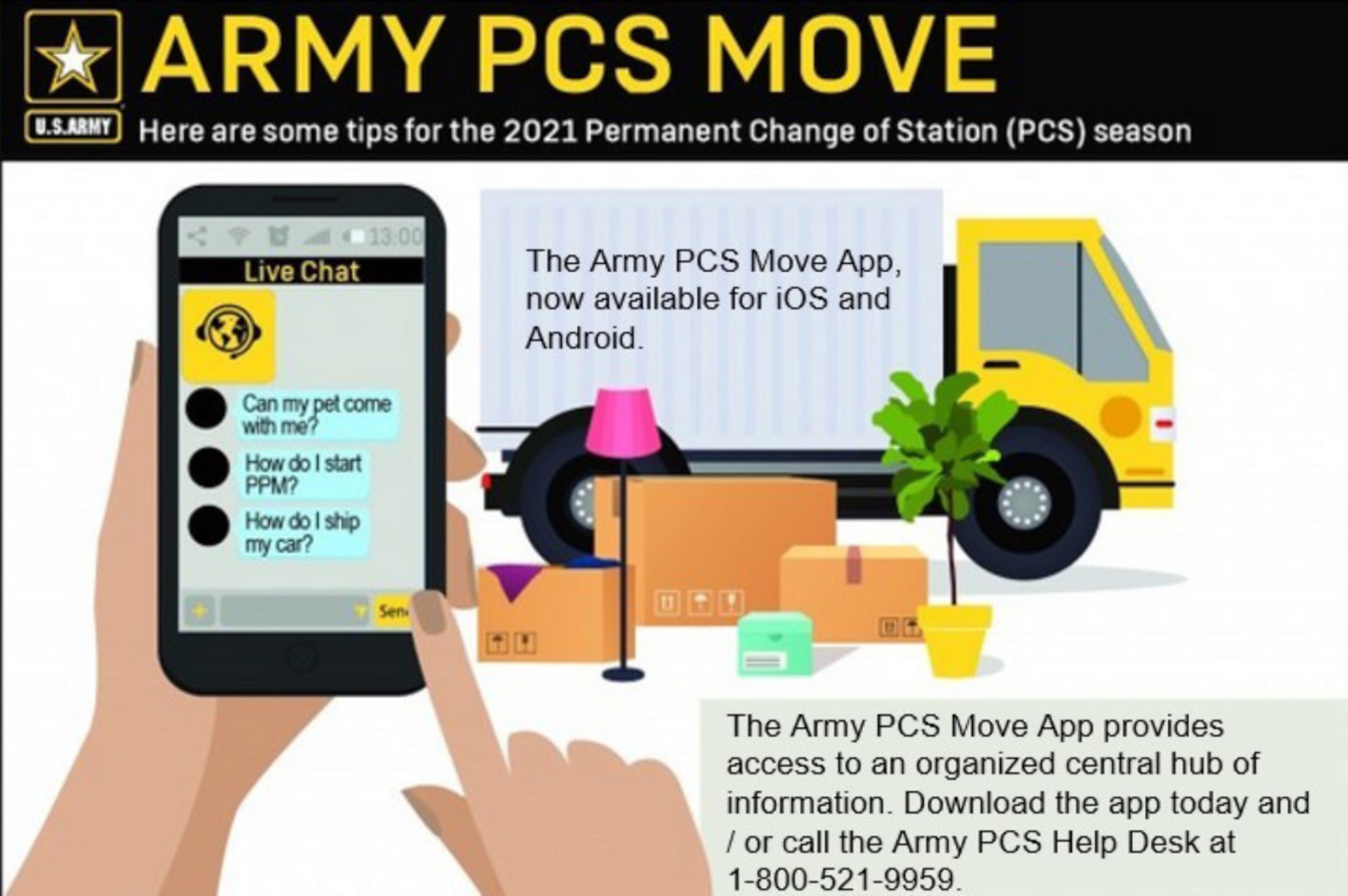 Source: media.defense.gov
Source: media.defense.gov
 Source: media1.popsugar-assets.com
Source: media1.popsugar-assets.com Source: images.everydayhealth.com
Source: images.everydayhealth.com Source: www.nerdfitness.com
Source: www.nerdfitness.com Source: i.ytimg.com
Source: i.ytimg.com Source: hips.hearstapps.com
Source: hips.hearstapps.com![Dvids - Images - 191St Mps Provide Psd [Image 6 Of 9]](https://d1ldvf68ux039x.cloudfront.net/thumbs/photos/1708/3691253/2000w_q95.jpg) Source: d1ldvf68ux039x.cloudfront.net
Source: d1ldvf68ux039x.cloudfront.net Source: img00.deviantart.net
Source: img00.deviantart.net Source: img.lovepik.com
Source: img.lovepik.com